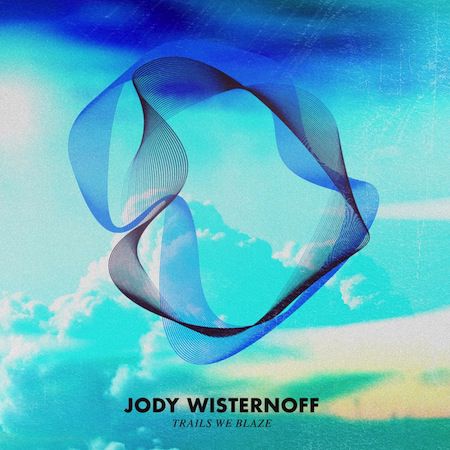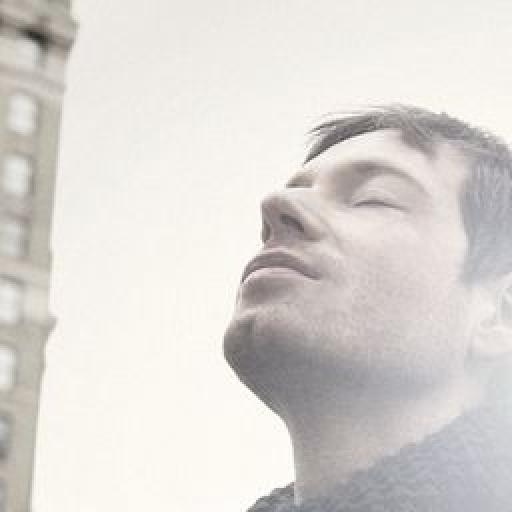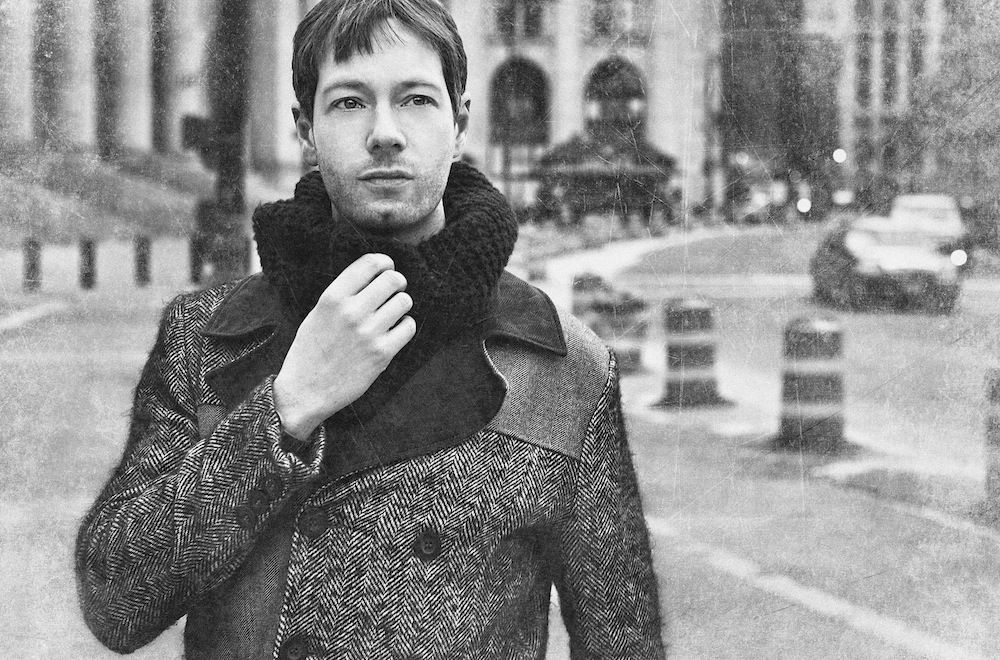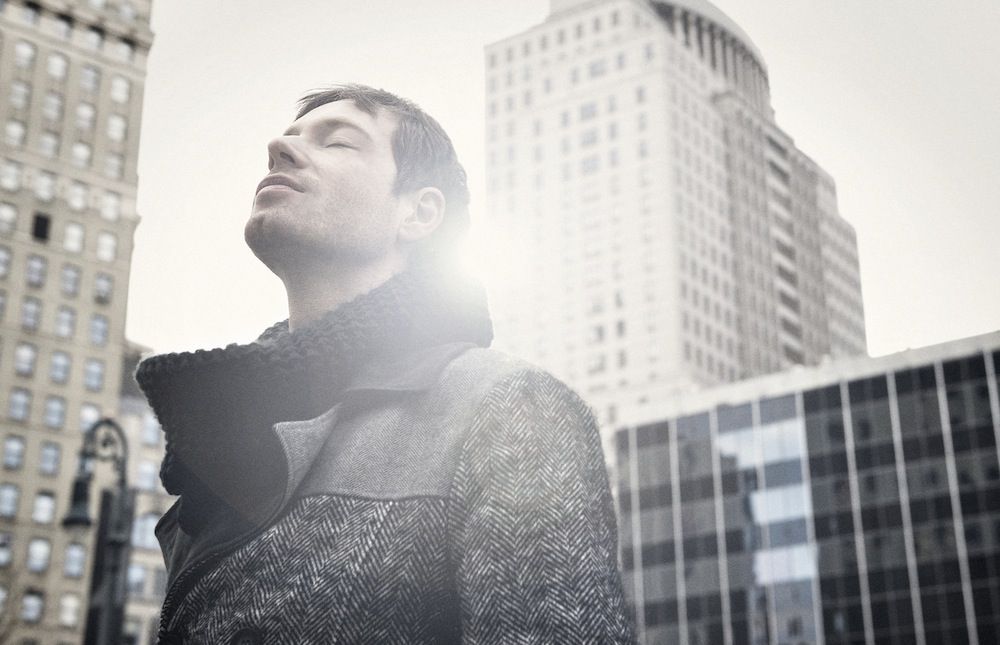Jody Wisternoff has been at the forefront of the electronica sound since the mid-80s, when the scene exploded from underground clubs into massive raves across the UK. At the tender age of 13, he reached the finals of the DMC World DJ Championship and since then teamed up with Nick Warren to form Way Out West. Despite releasing many hits, it surprises many to know that this year Jody released his debut solo album, Trails We Blaze, to critical acclaim.
We caught up with Jody in his Aladdin's cave of a studio in Bristol, UK to talk about his musical background, working with Nick Warren, his studio gear and production workflows, DJing preferences and his harrowing experience with tinnitus.
RS: Tell us about your background and what inspired you to take your first steps into making music.
JW: I was about 15 when I first got my hands on some kit. When you're about that age everything's like a toy anyway. So, this was like a toy that had some real potential... was more than just a toy. It was an old Casio synth. Then in school they had a music room with a 4-track and a few little drum machines. I think I was quite an obsessive child, quite focused in on whatever field I decided to lock down on. At a certain point I just thought this could be something that's worth investing a lot of time into, and I became addicted, and it generated quite a serious buzz.
RS: Did you have an instrument you could play at the time?
JW: I had piano lessons from the age of 10. I obviously hated them at the time but in retrospect they were very useful. Music-wise, I was into Hip Hop, early Mantronix and the early electro stuff. For all the kids of my generation, the American Hip Hop scene was quite exotic and fascinating. It was part of a scene with breakdancing and graffiti. Hip Hop just started to infiltrate British culture I suppose, and there was all us white kids who wanted to be black and from the Bronx! So, what we could really do was mess up our dad's turntables and playing drum machines and trying to rap. That was probably the beginning for me actually doing something creative. It was like equivalent for me of forming a band.
RS: When did you make your first record?
JW: When I was 16! I did a bunch of demo tapes for my brother, and then Smith & Mighty (underground, early Bristol vibe producers before Massive Attack) invited me into their studio. Then I just got on with it, put the track out, and Tim Westwood (famous BBC Radio 1 DJ) was into it. Things were actually happening, and I was in school doing A-levels, and in the meantime doing interviews with Face magazine and things like that.
RS: Not an average teenage experience then! How did that impact you?
JW: Yes. But when you're young you take it in your stride. You think you deserve it for some kind of strange reason. You're so precocious that you just live in the moment. So, I decided there was no backup. This is what I was going to do.
RS: You didn't have anything else you might have gone on to do?
JW: I quit my A-levels, went straight into music and had absolutely no backup plan at all, which is very dangerous. I began playing raves and DJing at about 16, 17. You know, all these dodgy illegal parties from South West to Oxford, queuing up behind the decks with a big pile of records waiting for your turn to play.
These were very unusual times. The whole scene was growing, with a bubbling underground.
RS: The music scene has changed so much since then! Was that 24 years ago?
JW: It's a different world. Yes, House has gone worldwide, and back then it was mainly a British thing with some cities from the States involved too. Although House music was invented in the States it was never really accepted until about 2 years ago! *laughs* And now it's called EDM!
RS: So when did you go from Hip Hop to House?
JW: So, basically I just got into it as a teenager and got into cutting and scratching on the decks before actual mixing, playing Funk and Hip Hop. Then the House thing just gradually came in. Hip Hop went to breakbeat by speeding up the beats. Then the whole rave scene happened, and before it matured into Drum and Bass I jumped into the House scene. I hooked up with Nick Warren in 1993, also in Bristol, who was looking for a studio partner at the time. We're still working together, as Way Out West, on our fifth album - but we're going slowly as we're both fully into our own careers as well.
RS: So that's a 19 year partnership! Longer than most marriages...
JW: Yeah it is! We've got a trial separation going on but it's not working! Love working with Nick. I keep thinking about collaborating with other dance producers... in some ways it's a great idea, but then again if I'm working on a track and it's really starting to happen, I'm not sure I want to bring someone else in. Whereas when Nick and I make something that works, the magic is there, we've got this synergy. The magic was there from the beginning. For some reason it just happened.
RS: But you do collaborate with vocalists on your latest album, Trails We Blaze.
JW: Yeah. That's a different thing. I'm all up for working with musicians and singers

Trails We Blaze by Jody Wisternoff
RS: I was listening to the album and am liking the stuff you're doing. Feels groovy - quite different to where House music was in UK a few years back?
JW: Definitely. The groove has become more of a priority. BPMs have dropped hugely over the past year. The sweet spot now is about 123 BPM when you're writing, when you're playing live it gets up to about 125, but a couple of years ago 128 was standard. So, it's all slowed down and there's more room for the groove to breathe. Maybe I'm just getting old?
I've got this theory where your perception of BPM is directly related to the amount of time you've spent alive. So, like our perception of time relates to how much time you've been around. So, therefore, as you get older it feels like days go faster, so perhaps BPMs are related to in the same way.
RS: So, similarly it's inverse to how the speed of the world; communication, etc. is becoming faster.
JW: Yeah! You've just added a whole new page to the thesis I'm writing on it ;-)
RS: Interesting, as Dubstep is another genre that allows the groove to breathe.
JW: But, that's too slow! (laughs). I love it when that vibe blends with House. The bassline thing has always been good, being a Bristolian - and Bristol being the land of bass! I'm into the heavy basslines. Saying that, there's a classic, Strings of Life by Derrick May, has no bass line! That is one of the all-time classic tracks!
RS: Cool. Do you find there are still a lot of people out there that don't get EDM?
JW: I think the thing that can put people off is the insistent kick drum. When I first heard House as a kid I think the 4-4 beat turned me off instantly. I felt it needed some funk, hits and snares in interesting places. It might be a bit controversial saying this, but when I took MDMA and heard dance music, something changed forever, and I fully understood it and was locked in the groove. It's a chemical memory that'll maybe last forever. I'm not saying you need drugs to understand House music, it could be a natural high that does it, but it can make things clearer. Theoretically, it's probably not a good idea to have a pulse or beat that is tedious.
RS: Well, that's what I noticed about your music. When you listen to a lot of other producers creating 4 to the floor based tracks, it can become repetitive very quickly. But, you've got that something in there, the groove, the vibe, that keeps it feeling fresh. Actually this is a good segue to move into the realm of creativity...
What's your inspiration that drives you to break the mold? Is it what you listen to, or other elements in your life that informs you?
JW: It's a funny one talking about what inspires you to make music. For me it's about being relaxed. When you're in the zone and you're creating it's possibly a mild form of meditation. I'm not sure. I think it's healthy for the body, mind and soul. Ha, sounds a bit new age. If I'm honest, I like to try and copy tracks I think are hot. That's one of my main inspirations. The quality of productions at the moment is really high. These are good times for dance music. There's people that are raising the bar all the time and you're constantly striving to take ideas further.
RS: So, very much the way any art form progresses and changes?
JW: Yeah. I hear some people say they lock themselves away and don't listen to any external influence. For me I prefer to take it all in. Plus being a DJ you need to constantly listen to a range of stuff. So, I'm heavily influenced by what I'm playing. Also, having kids has changed my vibe.
RS: Do your kids enjoy your music?
JW: Charlie, my little boy, sits on my lap and whilst I'm writing he'll be there for like half an hour. Then you can feel his stomach muscles getting tight and he begins rocking and gets his fist up and shouts “dance”. That's one of his four words he can say!
Having family does make you see your youth... seeing the world through their eyes - a youthful kind of energy. So, I'm sure that rubs off. A few of the tracks on the album were conceived when my wife was first pregnant. The melody for Surrender, which became the hook, was created the day I found out. Anything that makes you feel very alive, alert and amazed is inspiring.
RS: How does creativity strike you? For example, only when you're in the studio with you Mac/synths to hand, or anywhere?
JW: Well, things can definitely pop in out of the blue. I might be having a shower and I'll have to finish that quickly so I can pop down and get the melody or the whole song out of my head. I've got to turn off the radio, or other distractions to make sure I get it down somehow, before it vanishes after about five minutes. I don't get out the dictaphone or anything and hum it in, but go straight for my laptop.
Inspiration can strike anytime. Then other times it can leave you for months even though you're surrounded by awesome synths - and nothing comes.
RS: When you have a dry patch what's your process?
JW: I work through it. It's such an addictive thing. You're chasing the buzz of creating something. It's like a sonic morphine! You need to fight for it. Also, there's plenty of younger guys waiting in line to take your place. Gone are the days when you could write one big record, sit back and let the money roll in. But, saying that if you frequently put something out which is mediocre you're going to do yourself more damage. It's better to put the occasional hot track than a constant flow of fillers, just to keep yourself in the game.
RS: So, by working through those kind of moments, you must have a whole bunch of sessions that are unfinished?
JW: Yeah! And they always sound really good when I'm flying home from a gig on the plane. Then the next morning I think maybe the reason I never finished it was because it's not quite right. But nothing's ever really lost. I often take little parts of these projects.
Jody Wisternoff describes EDM as a chemical memory that changes you forever.
RS: It's been well documented that you suffered from the T word which scares many musicians: tinnitus.
JW: I got a real bad spell of it in 2006. It kind of overtook my life, it's still there but I've managed to accept it by tuning it out most of the time. I think when something like this happens to you, you think, 'why me?' But the more you go through life the more you realize that a lot of people have got a degree of an issue with it. It's actually there for everyone: if you go into a sound proofed room, you will hear tinnitus. It's the sound of the brain ticking along. But for some, it becomes more of an issue and becomes amplified. There was a time when it was horrific, because I was constantly tuned in to it.
RS: How did it affect your work?
JW: That's the time I took 6 months out. My hearing was all mangled and my sense of amplitude was in a state. It was pretty nasty. I think the key is to try to relax and not get uptight about things. I'm more able to manage it now.
RS: Thanks. We wish you to stay well Jody! You play live a lot. Do you still use vinyl?
JW: No. I have my tracks on a USB dongle and straight into my Pioneer CDJ-2000. I bring two dongles and a third as a backup as well, because you never know when some idiot is going to take your dongle whilst you're not looking!
RS: So, a lot of people are talking about going to CDJs from using Ableton on their laptops.
JW: Yes! That's because the new generation of CDJs are solid. They're dope man. You'll see Sasha DJing on CDJs now, and he was the guy that pioneered taking an iMac into clubs! I think people are going back to CDJs because they realize it's more fun mixing that way. So, you don't need a laptop, and others use a laptop as a type of shield or buffer which the crowd can focus their attention on.
RS: There are a number of ways which CDJs talk to Traktor, Serato and Ableton (via The Bridge). Will you ever go back to using software and CDJs in tandem?
JW: Maybe in the future. Right now, I'm busy enough with three CDJs: two for mixing the tracks and the third for effects and samples which I can add on the fly. I did use Ableton for about a year in clubs. It was good fun. There was almost too much potential for adding things for the sake of it.
RS: So, it's almost better to DJ inside some limitations?
JW: Yeah. It's more enjoyable physically mixing and not needing to stare at a screen. It probably looks better mixing with your arms from a crowd point of view. Plus, the latest versions of the Pioneer mixers are pretty nice. They have proper feedback delays, so if you turn it all the way to the right it actually does a dub loop thing: sending the channel back on itself. So, you can do some incredible stuff. I actually discovered that particular trick by accident at my last gig on Friday. At first I thought someone had modified the mixer, but it's the latest firmware from Pioneer. I do this in the studio all the time, so it's great to be able to do this in a club.
Jody considers how much he loves his Pioneer CDJ-2000s for live performance.
RS: So, you've got some tasty looking gear here in your studio. Run us through some of your favorites?
JW: The M5 Macbeth. There's so many variable, being semi-modular you can really get busy with it and make some amazing things happen. Then there's the good ol' 808 and 909. I still use the 808 all the time. It's a standard and is alive.
RS: Do you ever get tempted to use the software equivalents?
JW: Yeah. Often if I'm being lazy I'll just program a sample of a 909 clap... but with this thing, every hit of the clap sounds different because it's analog circuitry. If you run a 4 bar loop and record it into Pro Tools it's going to have more life.
The Prophet 5 and Jupiter 8 are my two go-to synths... [Jody looks longingly at them as they are currently out of action]. The SH-5 is quite a gnarly little thing, with raunchy filters and I think it's the sexiest SH synth out there.
RS: What about the software side of your studio?
JW: Well, Ableton is what I write in and Pro Tools is what I mix in. I never got comfortable enough or quick enough with Logic to write in it without needing to think about what I'm doing. I'm quite interested in checking out Bitwig too.
I've been using Ableton since about version 2 or 3 - since it really began to get stable and work well. Then I was using it just on a laptop along side Pro Tools and bringing little bits in. But now I pretty much write 90% in Ableton, bounce all the stems, bring it into Pro Tools, chop off all the waste and then get busy with the mix.
RS: Do you apply all processing in Ableton? What about 3rd party plug-ins?
JW: I generally do mainly subtractive processing whilst writing in Ableton. I'm loving Omnisphere, Trilian and Stylus RMX by Spectrasonics. I have tons of plug-ins I use. Sonic Charge stuff like Synplant and MicroTonic is what I go to for white noise, hats and things like that. Nerve, which you can easily audition different drum parts, like a kick, by flying through its bank. It's really quick and no need for a menu. All the Waves stuff I use, Diva by u-he is also tasty. Effectrix is the glitch king.
I love the Sonnox EQ... and of course Native Instruments Kontakt and Reaktor, which I've been following for a long time - since it was Generator on PC. Although I don't go in and program things from scratch in Reaktor, I do explore the user library and find useful things there. Then there's Sylenth which is alright! I also use The Glue as a limiter which is actually very nice to use when writing. There's also Altiverb, Dubstation and Fabfilter.
RS: What about any of Ableton's built-in instruments and effects?
JW: Yeah, Sampler. I love Sampler. It just integrates so well which is a plus over 3rd party sampler instruments. But I'm not crazy about the filters which are useable but sound a little artificial when compared to hardware samplers. I've recently found that Sampler's workflow makes it really quick to try things out like hitting certain notes you wouldn't necessarily try and tune audio to using other samplers.
RS: When you're mixing do you feed out into any external gear?
JW: Just into the summing amp. I go to 4 stereo busses: drums, bass, and 2 music ones. They go into the summing amp and back into one. It's getting out of the box a little bit. I'm not sure if it really makes that much difference. Maybe you get a bit more headroom, a little bit more separation. I think it's very subtle and mostly psychological, but it does feel nice.
RS: Can you run us through your mixing process?
JW: When I'm working in Pro Tools I feel like I'm getting closer to the prize. I can almost see the light at the end of the tunnel. When I'm working in Ableton I'm writing, and on a creative buzz. But when I start working on the mix I can almost smell the product and that happens for me in Pro Tools. It's where I can really start thinking about the mix, the levels, panning, EQ, automation and trying to achieve some sense of space. It can take a long time... I take months! I do a version and test it out at clubs and realize there's something not quite right. There's just so many variables when mixing.
RS: I know you're planning a new Way Out West album... what direction will it go in?
JW: Probably a bit more experimental, but still dance music based.
RS: If there was someone you could collaborate with... who would you like to?
JW: There's loads of people out there, I just tend to finish off tracks myself before anyone else gets involved. [laughs] There's a guy from Alfie who's just remixed my next single, so might do something with him. Maybe working with someone like Jamie Woon would be cool.
RS: What advice would you give to aspiring producers and DJs getting started?
JW: Do it for the right reasons. Don't think of it as a shortcut for fame and fortune. When we first started out there was no such thing as superstar DJs or super-clubs. We got into the scene because it gave us a buzz. So, do it for the right reasons - for the music and make sure the music has strong roots. If you love making music, just make it and enjoy it for pleasure and if something comes from it, then great. It might take 20 years to get somewhere. I've got friends who've just made it now after toiling away forever, so stick at it! I think it's important to make music for the right reasons, so it's a labor of love, it's just what you do.
Discover more about Jody Wisternoff on his website here.
Listen to Trails We Blaze and other music by Jody here.





 © 2024 Ask.Audio
A NonLinear Educating Company
© 2024 Ask.Audio
A NonLinear Educating Company
Discussion
Want to join the discussion?
Create an account or login to get started!